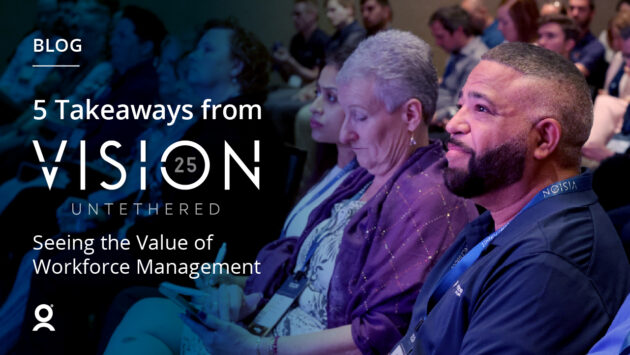At a time when digital transformation is continuous, business leaders must embrace this ongoing journey to evolve to remain competitive. Modern workforce management plays a key role in this evolution, helping organizations continuously adapt by tapping into the power of their people.
The journey transcends merely adopting new systems or technologies; it’s about fundamentally redefining how we sense, adapt, and execute technology to aid managers in each of these areas. Although the technologies exist, businesses must move to deploy them, fostering a culture of agility and collaboration across departments. Successful organizations who build a digital-first workforce use advanced analytics for unique insights and to reimagine their operations to create a gap between themselves and their competitors.
In this blog, we’ve distilled insights from two recent articles (Cleaning up Your Tech Wasteland in 2024 and 5 HR Technology Predictions for 2024) featuring WorkForce Software senior leaders, Nicole Neumarker, Chief Operating Officer and Sandra Moran, Chief Marketing & Customer Experience Officer. They offer their expertise on how businesses can navigate this digital era to achieve a sustainable competitive advantage.
Expert Predictions
1. Urgency of Modernizing Legacy Systems: “Relying on outdated technology is a risk that businesses can’t afford,” warns Nicole Neumarker, WorkForce Software Chief Operations Officer. Legacy systems not only slow down operations but also present significant security vulnerabilities. Upgrading these systems is more than a technological shift; it’s a strategic move towards safeguarding data, enhancing operational efficiency, and staying ahead in a digital-first marketplace. Modernizing these systems ensures businesses can speed execution from idea to operations to stay ahead in an era where agility and responsiveness are key to success.
2. Elevating Employee Experience in the Tight Labor Market: Sandra Moran, WorkForce Software Chief Marketing and Customer Experience Officer predicts a continued rise in unionization efforts and employee demands for equitable treatment. “Companies need to proactively address employees’ needs, offering fair pay, benefits, and improved working conditions,” she advises. This focus on creating a meaningful value proposition is vital to attracting and retaining talent. HR technology plays a crucial role here, enabling companies to allocate resources effectively and meet their workforce’s evolving expectations.
3. Transforming Workforce Management through Data and Analytics: Moran emphasizes the transformative power of HR when paired with machine learning and AI. “Predictive analytics will redefine how we manage our workforce, offering insights that drive strategic decisions and enhance operational efficiency,” she notes. This shift isn’t just about technology; it’s about leveraging data to build a more responsive, agile, and employee-centric organization.
“Predictive analytics will redefine how we manage our workforce, offering insights that drive strategic decisions and enhance operational efficiency.”
Sandra Moran | Chief Marketing and Customer Experience Officer, WorkForce Software
4. Evolving Role of HR in Business Optimization: Moran highlights the changing landscape of HR. “It’s now a strategic driver within businesses,” she notes. HR’s role in automating processes and enhancing employee experience is becoming increasingly important. This change shows how businesses are starting to see their workforce differently—not just as workers, but as critical resources in their success and plans for growth.
5. Adopting Digital Scheduling and Labor Optimization: “Digital HR systems are key to operational agility,” states Moran. By digitizing scheduling processes, companies can offer greater flexibility and meet diverse employee needs, such as the opportunity to control availability and shift changes when unexpected needs arise. This evolution is crucial for improving retention and responsiveness, demonstrating how technological advancements can benefit the organization and its employees.
6. Improving Operational Performance through Systematic Feedback from Frontline Workers: Neumarker highlights the importance of actionable employee feedback. “Gathering quality feedback from the workforce is vital for driving operational improvements and boosting performance,” she states. This approach moves beyond traditional surveys, tapping into the real-time insights and experiences of employees to optimize processes and align business operations more closely with the needs and expectations of the workforce.
7. Continuously Improving and Adapting Digital Transformation: Neumarker points out that digital transformation isn’t a one-off task but an ongoing journey of growth. “It’s about staying competitive by constantly learning and adapting,” she notes. Businesses succeed by remaining agile, embracing new technologies, and continuously refining their operations. This proactive approach ensures they don’t just keep pace with change but lead the way in leveraging technology for improved business performance.
“Gathering quality feedback from the workforce is vital for driving operational improvements and boosting performance.”
Nicole Neumarker | Chief Operations Officer, WorkForce Software
8. Optimizing Labor Costs and Employee Satisfaction: Moran discusses the importance of labor optimization in today’s workforce. “Adopting a total workforce mindset allows HR and operations to collaborate effectively, optimizing investments in people and supporting employee demands,” she explains. This strategy is necessary for maintaining or improving the bottom line, demonstrating the direct impact of modern workforce management on a company’s financial health and employee satisfaction.
9. Building a Quality Digital Talent Bench: “Having the right team is crucial in the digital age,” Neumarker points out. Companies that excel in the digital landscape invest heavily in acquiring and nurturing top talent. This involves hiring individuals with the right digital skill sets and fostering an environment of innovation and learning. A strong digital talent bench is essential for creating and sustaining high-quality digital experiences, driving operational improvements, and ensuring that the organization’s digital strategies are effectively implemented and continuously evolving.
10. Incorporating AI and Machine Learning into Business Operations: Neumarker underscores the significant shift in AI, transitioning from a niche tool to a vital component in business strategies. “AI and machine learning are now essential for enhancing business efficiency and improving decision-making processes,” she asserts. This evolution means companies must adapt to stay relevant and competitive. AI’s capacity to analyze extensive data and provide insights paves the way for enhanced, strategic decision-making, significantly advancing business operations and growth.
Explore More Insights
In 2024, a digital transformation journey that leads to improved agility and execution is critical for success and often dependent on how organizations manage their workforce. These predictions underscore the necessity of aligning workforce management with digital advancements. WorkForce Software’s approach focuses on streamlining workforce processes and enhancing employee experiences, an imperative for companies in an evolving digital arena.
To see the full predictions discussed, we invite you to read the articles by WorkForce Software leaders Nicole Neumarker and Sandra Moran. Their commentary in Cleaning up the Tech Wasteland in 2024 and HR Technology Predictions for 2024 provides a deeper dive into the transformative power of modern workforce management.
2023 Gartner® Market Guide for Workforce Management
By 2025, 80% of large enterprises with hourly workers will have invested in workforce management. Get the Report
Build Your Case for Modern Workforce Management
See why modern workforce management is the strongest ROI HR technology investment you can make. Checkout the Guide






